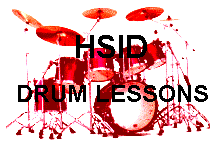|
Downloads *
Drummers Trivia *
Drummers Chat Rooms *
Rudiments *
Digital Music *
Knowledge Assessments *
TD Archives *
Drum Set Buyers Guide *
Bass-Player Jokes *
Assembling a Drum Set *
Parts of a Drum Set *
About HSID *
Video Troubleshooter
Bill Powelson's School of Drums
School of Drums
Back to the Tempo Dispatch Archives
ISSUE #66 \__\__\___THE____/__/__/ June 5, 2002
_______________TEMPO DISPATCH ___________
Newsletter For Drummers and Drumming Enthusiasts
Copyright Bill Powelson 2002 all rights reserved.
____________'IT'S ALL ABOUT DRUMS'_______
Tips * Tricks * Hints * Ads * Freebies * Lessons *
_________NOW more than 13,000+ SUBSCRIBERS!__________
IN THIS ISSUE . . .
FEATURE ARTICLE:
1. In this lesson I'll try to help clear-up
some of the TERMINOLOGY confusion caused by
TIME SIGNATURES like 6/8 and 4/4.
2. Humor: The Indian Way
_____________________________________
|__________FEATURE ARTICLE___________|
DRUM LESSON
TIME SIGNATURES: 6/8 VERSUS 4/4:
This lesson is for the more advanced
'thinkers' out there . . .
It may not be for ALL beginners.
BEGINNERS: If this lesson seems a
little 'over your head' . . . scroll down to the
additional BEGINNERS LESSON, below it.
QUESTION:
* What's the difference between 6/8 and 4/4?
ANS:
Not much!
FOR EXAMPLE . . . (The 'BLUES BEAT')
8TH 'TRIPLET' 2/4 or 4/4 will contain all the SAME
RHYTHM patterns as 6/8 and 12/8 respectively.
Yet, the rhythms may be written EITHER way.
THINK ABOUT IT!
The counting-procedure, the time-signature
and the notation involved, WILL ALL be different,
but the RHYTHMS CONTAINED, WILL ALL BE THE SAME.
The counting-procedure, the time-signature
and the notation involved, is determined
by the writer. This in-turn, effects the
TECHNICAL TERMINOLOGY WE USE when referring
to the rhythm patterns contained in each of
these time-signatures.
....................................................
NOTE:
We tend to get the TECHNICAL names for a rhythm
pattern from the time-signature, and the way
we SEE THAT PATTERN in its written form.
....................................................
So . . . we end up with dozens of DIFFERENT
TECHNICAL NAMES for the SAME GENERAL PATTERNS. It's
a nightmare!
For example, think of the BLUES BEAT. It 'might'
be written as 6/8, or 12/8!
Likewise, it may be written as 8th TRIPLET 2/4,
or 8th TRIPLET 4/4! (In truth, it could also be
written several OTHER ways!)
Depending on HOW it's written . . . the TECHNICAL
NAME of the pattern may change up to a dozen (or more)
times!
X X X X X X
S
B
If it is written in 6/8 (or 12/8),
we'll be looking at six (or 12) 8th notes on the cymbal
line . . . and the proper way to count them would
be 1, 2, 3, 4, 5, 6 etc., etc. The technical name
would be 6/8 or 12/8.
ANOTHER WRITER might choose to write the same
4,096 'BLUES BEAT' pemutations as '8th TRIPLET 2/4' (or 4/4.)
In which case the proper count would be '1 an a 2 an a'
etc., etc.
NOW . . . The technical name for all the SAME
beat permutations will become '8TH TRIPLET 2/4, OR
8TH TRIPLET 4/4'!
Maybe that's why a street-name like 'BLUES BEAT'
has taken-hold to become the 'STANDARD NAME' for
this rhythm structure! Otherwise, when communicating
onstage . . . we might need to call this structure by
ALL its (twelve or more) different technical names,
in one VERY LONG (five minute) breath.
SHUFFLE? Same problem!
The SHUFFLE beat is blessed with ALL these same
confusing issues, plus a COUPLE MORE! It's no
wonder there's so much ONSTAGE confusion about these
beat names! It's a confusing 'TERMINOLOGY NIGHTMARE' for
students and professionals as well.
We might write the Shuffle beat as 6/8, 12/8, 8th
TRIPLET 2/4 or 4/4 . . . and a host of other ways as well.
AND, THERE'S ANOTHER WAY . . . (STILL MORE CONFUSION!)
Another writer might choose to write the Shuffle
pattern as a dotted-8th/sixteenth rhythm in 2/4 or 4/4,
producing the SAME SHUFFLE RESULT!
NOW . . . all the SAME beat permutations become
technically known as 'Dotted Eighth / Sixteenth 4/4'!
Then the count becomes 1 e an a, 2 e an a, etc., etc.
It means we play only on the count and the 'a', which
produces the SAME rhythm we call SHUFFLE . . .
The Blues, Shuffle and Swing beats are all actually
the same general rhythms, give or take a few notes on
the cymbal line.
Those rested-notes are VERY important distinctions
though, because the LESS cymbal notes we play . . . the
FASTER the rhythm will be geared . . . which creates
an entirely new and different 'feel', as the tempos
increase . . .
NOTE: X = ANY NUMBER
These same confusing issues occur
in 3/4, 5/4, 7/4 and all the other X/4 versus X/8
signatures. Similar confusions occur in the X/16
and X/32 signatures as well . . .
It's a confusing, redundant mess!
FOOD FOR THOUGHT . . .
FOR EXAMPLE: 8th-triplet 3/4.
(Counted: 1 an a 2 an a 3 an a) 'COULD' be
written as (and named) 9/8. (Then it would be
counted: 1, 2, 3, 4, 5, 6, 7, 8, 9)
. . . All the rhythms contained in either written
method are essentially the same rhythms . . . (only the
note-values and the TERMINOLOGY will be changed . . .
to confuse and frustrate us all.)
HERE'S SOME HOPE!
There IS an UPSIDE to all this! :)
(NOTE: X = ANY NUMBER)
As we learn ALL the beat permutations of any
'8TH TRIPLET X/4' . . . We will also be learning a
relative X/8, X/16, X/32 structure at the same time.
SO . . . X/4 is ALL we need to study! We get
the other rhythms by proxy! The rhythms are the
same. Only the notation, count-procedure and TECHNICAL
TERMINOLOGY will be altered if the denominator is other
than 4.
All this is covered in-depth within the time-signature
lessons of my course. (My objective here is
simply get you thinking about it . . .)
..................................................
.......................................
Now, here's some special help for,
BEGINNING STUDENTS OF DRUMSET:
FOLLOW THIS LESSON-PLAN, FOR BEST RESULTS:
The drum lessons at are arranged
(from the top-down) at the web site in such a way as to
allow you to achieve the BEST possible results, in
the LEAST amount of time, while enjoying the MOST
POSSIBLE FUN . . .
We would follow this exact same plan if you were
to enroll as a private student at my private teaching
studios. I use this lesson plan because it works!
You'll be WISE to follow the plan, FROM THE TOP DOWN,
in the (early-beginner) stages of study.
MEMORIZE the BASIC DANCE BEATS!
MORE ADVANCED/INTERMEDIATE STUDENTS . . .
Skim lightly over any material that seems too basic
or too simple . . . BUT DIG-IN AS THE LESSONS GET MORE
DIFFICULT. Almost every lesson in this 100-lesson
course is intended as one-week of study for the average
student in private study. Some students move faster
while others, slower.
Here ONLINE . . . Many of you may find it easy to absorb
SEVERAL lessons per week, while others may need several weeks
on each lesson! That's the advantage of online lessons!
The cost is the same for EVERYONE.
........................................................
_________________________________
|___________HUMOR? ______________|
The Indian Way
The old Sioux chief sat in his reservation hut,
smoking the ceremonial pipe, eyeing the two US
government officials sent to interview him.
"Chief Two Eagles," one official began, "you have
observed the white man for many generations, you
have seen his wars and his products, you have
seen all his progress, and all his problems."
The chief nodded.
The official continued, "Considering recent events,
In your opinion, where has the white man gone wrong?"
The chief stared at the government officials for over
a minute, and then calmly replied:
"When white man found this land, Indians were running
it. No taxes. No debt. Plenty buffalo. Plenty beaver.
Women did most of the work. Medicine man free. Indian
men hunted and fished all the time."
The chief smiled, and added quietly, "White man dumb
enough to think he could improve system like that.
_____________________________________________
Thanks again to my old friend Jim Casey at
Vermont Drums Online: www.vermontdrums.com
_____________________________________________
 Treat yourself to my BEST stuff! You have no idea
how much time I can save you!
Treat yourself to my BEST stuff! You have no idea
how much time I can save you!
END OF TEMPO DISPATCH #66 JUN 5, 2002
Copyright Bill Powelson 1994 all rights reserved.
|



